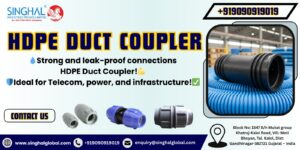The farming industry is a crucial component of the global economy, delivering food and other essential item for people around the world. However, the industry is also facing a number of issues, containing climate change, increasing input expenses, and rivalry from other sectors. In quest to fulfill these challenges, farmers and farming businesses are gradually looking for new and inventive methods to increase their workings. Singhal Industries is one of the leading HDPE bags manufacturers in the country.
One such invention is the usage of HDPE Bags. HDPE Bags are a kind of packaging that is manufactured from strong, durable fabrics such as polypropylene or polyethylene. They are useful in a diversity of sizes and shapes, and can be utilized to keep and ship a broad range of farming items, containing grains, fruits, vegetables, and composts.
HDPE Bags propose a number of advantages over conventional packaging fabrics, such as plastic bags and wooden crates. They are sturdier and more enduring, making them less possible to tear or break during handling and transport. They are also more resilient to dampness and pests, which helps to guard the quality of the items they contain. In accumulation, HDPE Bags are recyclable and ecofriendly, making them a more justifiable choice than conventional packaging fabrics.
HDPE plastic Bags are a kind of industrial packaging container that is manufactured of woven fabric. They are typically used to store and transport dry, granular items, such as cement, grain, and sugar. HDPE Bags are a sturdy and durable kind of packaging that can resist a lot of wear and tear.
In recent years, HDPE Bags have become gradually familiar in the agricultural industry due to a number of aspects, containing:
- Cost-effectiveness: HDPE Bags are a useful option to conventional packaging procedures, such as drums and totes.
- Sustainability: HDPE Bags are manufactured from recycled fabrics and they are Recyclable.
- Strength and durability: HDPE Bags are solid and durable and they can resist a lot of wear and tear.
- Versatility: HDPE Bags can be utilized to keep and ship a broad variety of farming Products.
- Customizability: HDPE Bags can be modified to fulfill the particular requirements of farming businesses.
As a effect of these aspects, HDPE Bags are now a usual sight in farming settings. They are utilized to keep and transport a wide variety of products, including:
- Grain
- Seeds
- Compost
- Pesticides
- Animal feed
- Manure
Understanding HDPE Bags: Fabrics and Manufacturing
HDPE woven Bags are manufactured from a diversity of materials, containing polypropylene, polyethylene, and hemp. Polypropylene is the most usual material utilized for HDPE Bags, as it is tough, sturdy, and light in weight. Polyethylene is also a familiar fabric, as it is comparatively low-cost and easy to function with. Hemp is a sustainable fabric that is becoming gradually familiar for HDPE Bags, as it is tough, durable, and recyclable.
The manufacturing procedure for HDPE Bags differs relying on the fabric utilized. Polypropylene and polyethylene sacks are usually manufacture on a weaving loom, while hemp sacks are normally manufactured by hand. The weaving procedure involves interlacing two or more threads to build a fabric. The fabric is then slice to size and stitched into a sack.
Advantages of HDPE Bags for Agriculture
HDPE Bags have several advantages that extend beyond mere packaging. They propose a sustainable, cost-effective, and adaptable solution, changing the way farmers store and ship their products. From increasing storage competence to decreasing food waste, these bags are transforming the agricultural industry.
In addition to the general advantages of utilizing HDPE Bags, there are a number of particular advantages that make them perfect for usage in agriculture. These advantages contain:
- Decreased waste: HDPE Bags are manufactured from recycled fabrics, which help to decreased garbage.
- Enhanced product quality: HDPE Bags guard farming products from damage during shipping and storage.
- Increased productivity: HDPE Bags can be loaded and unloaded rapidly and effortlessly, which helps to increase competence.
- Decreased labor costs: HDPE Bags can be handled by a single person, which helps to reduce labor expenses.
- Enhanced Protection: HDPE Bags are less feasible to cause injuries than old-style agricultural packaging procedures.
The Environmental Effect: Sustainability of HDPE Bags
In a period where sustainability is not just a catchword but a requirement, HDPE Bags stand out as an eco-friendly packaging choice. They are biodegradable and recyclable, decreasing the agricultural sector’s carbon footprint and contributing to a greener atmosphere.
HDPE Bags are a more sustainable choice than traditional packaging fabrics because they are manufactured from renewable fabrics, such as polypropylene and polyethylene, and they are recyclable and decomposable. This means that they do not add to the growth of garbage in Landfills.
In adding, HDPE Bags are a frequently manufactured utilizing recycled fabric, which further reduces their environmental effect. For example, some producers of HDPE Bags use reused polypropylene to build their items. This helps to decrease the need for virgin materials and protects natural resources.
Increasing Efficiency: Storage and Shipping Advantages of HDPE Bags
HDPE Bags propose a number of benefits in terms of storage and shipping. They are solid and tough, making them less possible to tear or break during handling. They are also light in weight, which makes them stress-free for shipping. In addition, HDPE Bags are stackable, which saves space in warehouses and on trucks.
Effective storing is a crucial feature of the farming supply chain, and HDPE Bags play a crucial role in this region. Their space-saving design and stack ability make them perfect for enhancing storage space. Plus, their light in weight yet robust nature assures that farming products can be safely shipped without damage.
Strengthening Food Safety: How HDPE Bags Keep Produces Fresh
HDPE Bags also play important role in decreasing food waste. They propose a pest-resistant shield that helps in keeping the freshness and quality of farming products, thereby extending their shelf-life. This feature is particularly significant in areas where the agricultural supply chain faces challenges such as lack of refrigeration or longer shipping duration.
HDPE Bags help to keep the quality and freshness of farming products. They are resilient to moisture and pests, which helps to avoid spoilage. In addition, HDPE Bags enable air to flow, which helps to avoid the build-up of dampness and heat. This helps to keep produce fresh for Lengthier.
Cost-Effectiveness: The Financial Benefit of HDPE Bags
HDPE Bags are a cost-effective choice for packaging farming products & hence one of the key advantages of HDPE Bags is their financial benefit. The production charges of polypropylene is relatively low, which, mixed with the competence of woven sack bag manufacturers, results in an affordable packaging choice for farmers. They are less costly than conventional packaging materials, such as plastic bags and wooden crates. In addition, HDPE Bags are reusable, which further decreases their expenses.
Adaptability of HDPE Bags: Familiarizing to Different Agricultural Requirements
HDPE Bags are an adaptable packaging choice that can be utilized to keep and ship a broad range of farming products. They are commonly utilized for grains, fruits, vegetables, and fertilizers. In accumulation, HDPE Bags can be modified to fulfill the particular requirements of farmers and agricultural businesses. HDPE Bags are extremely adaptable, catering to a broad range of agricultural requirements. They are appropriate for keeping and shipping various kinds of agricultural produce, containing:
- Grains: Rice, wheat, corn, and barley
- Legumes: Beans, peas, and lentils
- Seeds: Sunflower, flax, and sesame seeds
The adaptability of HDPE Bags to varying climates and conditions is another significant advantage. They can withstand:
- High temperatures: HDPE Bags are heat-resistant, making them appropriate for usage in hot climates.
- Cold temperatures: These sacks help in keeping their structural integrity even in freezing situations.
- Humidity: HDPE Bags are resilient to dampness, avoiding the produce inside from getting moist and spoiled.
- Rough handling: The toughness of HDPE Bags makes them hardy to wear and tear during shipping.
Conclusion: The Long-Term Effect of HDPE Bags on Agriculture
HDPE Bags are more than just a packaging choice; they are transforming the farming industry. They propose an array of advantages, from increasing sustainability and cost-effectiveness to enhance storage efficiency and decreasing food waste. As progressions in woven sack technology continue, their effect on the sector will only grow, paving the method for a more efficient and sustainable future in farming.
HDPE Bags are a multipurpose and cost-effective packaging choice for the agricultural industry. They propose a number of benefits over conventional agricultural packaging procedures, including reduced waste, enhanced product quality, increased competence, decreased labor charges, and improved protection. As an outcome, HDPE Bags are a valuable asset to farming businesses.
Frequently Asked Questions (FAQs)
What are HDPE bags used for?
HDPE bags are used for packaging, retail shopping, garbage disposal, food storage, and transporting chemicals due to their durability.
Are HDPE bags waterproof?
Yes, HDPE bags are waterproof, making them ideal for protecting contents from moisture and water damage.









